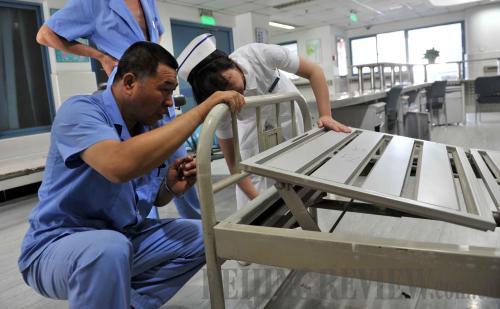|
 |
|
CREATING A HOME: Workers repair beds for the patients at the Beijing Huilongguan Hospital for the mentally ill on July 25 (LI WEN) |
On July 29, a knife attack took place in Shenzhen, south China's Guangdong Province. According to local police, a 40-year-old man with a history of mental illness killed three passersby and injured another five by the side of a road in Luohu District.
Just days before, another fatal attack was reported in Dongxing, Guangxi Zhuang Autonomous Region. It was reported that a knife-wielding man broke into a local family planning office on July 23, killing two government workers and injuring four others. According to investigations, the man also suffers from mental illness.
In recent months, a string of violent attacks committed by the mentally ill have been reported. Beijing alone had two such incidents in July. One man stabbed two pedestrians to death in Chaoyang District on July 17. Five days later, another man attacked four people with a knife at a downtown Carrefour supermarket, killing one and injuring three.
The outbreak of assaults has caused widespread concern and prompted an outcry for adequate medication, help and care for the mentally ill.
A serious situation
On the evening of July 5, 42 patients successfully escaped from a facility for the mentally disabled in Guangxi's Tengxian County. A few hours later, they were found and brought back to the hospital safely.
When asked about possible reasons, Huang Zichao, a previously well-behaved inmate, simply said, "It is too hot and cramped here. I miss my home."
His words outlined a simple truth: Facilities for the mentally ill in China, particularly in rural areas, are often basic at best.
"This hospital has been overloaded for years, leading to poor conditions that fall far short of the appropriate level for mental health facilities," said Liu Xianjie, Director of the Tengxian Heath Bureau.
According to the local government, mental ward capacity at the hospital should be limited to around 100 people, but the actual number has exceeded 300, making it hard to regulate.
"Guangxi is not the only place that has overloaded mental health facilities. The whole nation has resource constraints," said Zhang Zanning, a law professor at Nanjing-based Southeast University in Jiangsu Province who focuses on issues related to the mentally ill.
Statistics from the Ministry of Health show that in 2010 there were a total of 1,650 mental health facilities in China, among which only 874 specifically treated the mentally ill, with only about 20,000 certified psychiatrists and 30,000 nurses.
Meanwhile, according to the latest available figures from the Chinese Center for Disease Control and Prevention, China had more than 100 million people with some form of mental disorder in 2009, including 16 million people with severe mental illnesses.
"That means there are no more than two psychiatrists and three nurses for every 100,000 mentally ill people, which is much lower than the international average," Zhang said.
According to the World Health Organization, there are four psychiatrists and 13 nurses for every 100,000 mentally ill people worldwide.
"In medical schools, psychiatry is not as popular as cardiology or endocrine medicine. Students have fewer periods for psychiatric study," said Wu Yuefeng, a doctor at the Xi'an Mental Health Center in Shaanxi Province. "When they graduate, students prefer to work or study further in eastern areas, where rich psychiatric resources are concentrated."
The shortage of medical resources for the mentally ill can sometimes lead to dangerous consequences, said Guo Hongli, Deputy Director of the Beijing Municipal Mental Health Maintenance Institute.
"Mental health is not only an important public health problem, but also a serious social concern," he warned, emphasizing that recent assaults committed by the mentally ill are a consequence of the lack of medical resources.
"In the current situation, many mentally ill patients cannot get in-time treatment so that their illnesses become worse, which may lead to serious incidents such as violent attacks."
| 